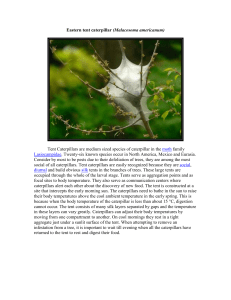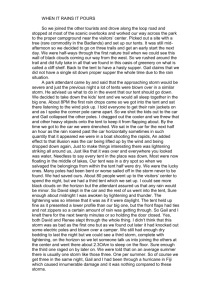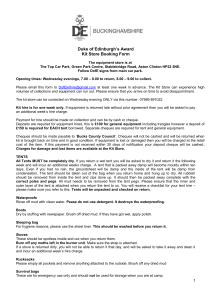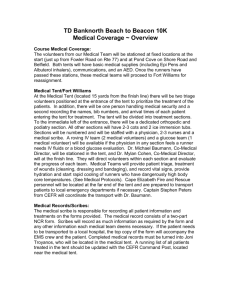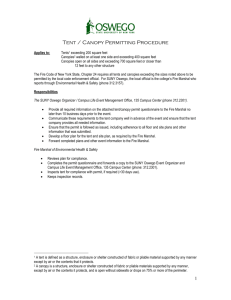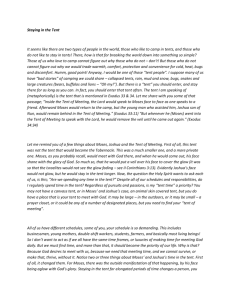Social structures form in Haiti
advertisement
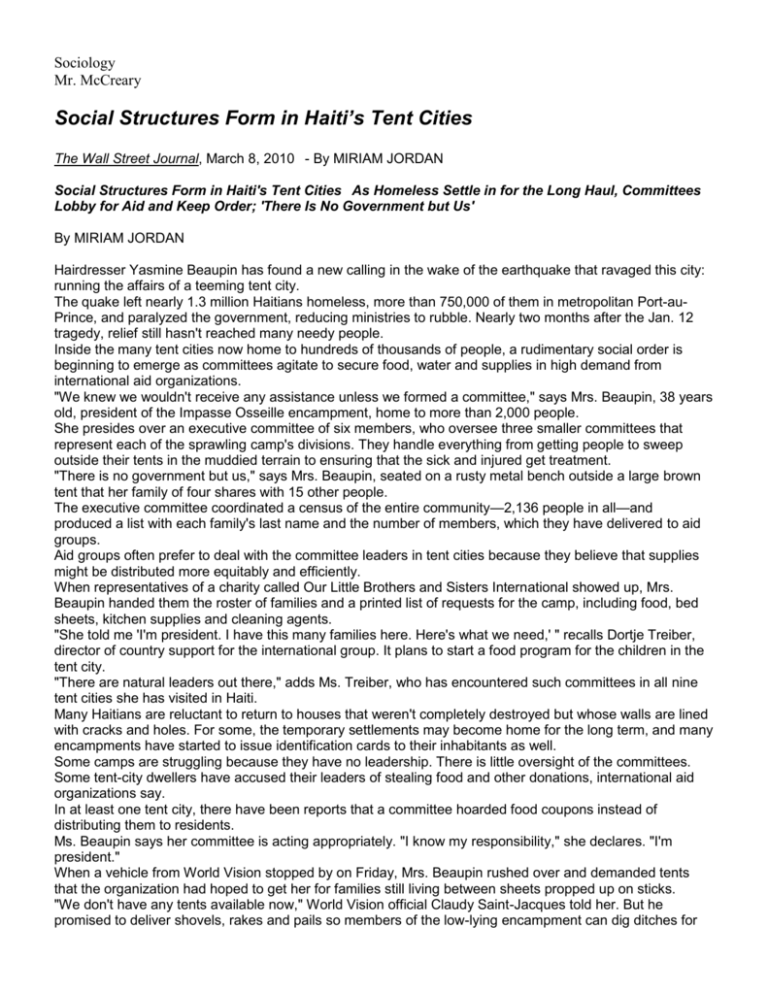
Sociology Mr. McCreary Social Structures Form in Haiti’s Tent Cities The Wall Street Journal, March 8, 2010 - By MIRIAM JORDAN Social Structures Form in Haiti's Tent Cities As Homeless Settle in for the Long Haul, Committees Lobby for Aid and Keep Order; 'There Is No Government but Us' By MIRIAM JORDAN Hairdresser Yasmine Beaupin has found a new calling in the wake of the earthquake that ravaged this city: running the affairs of a teeming tent city. The quake left nearly 1.3 million Haitians homeless, more than 750,000 of them in metropolitan Port-auPrince, and paralyzed the government, reducing ministries to rubble. Nearly two months after the Jan. 12 tragedy, relief still hasn't reached many needy people. Inside the many tent cities now home to hundreds of thousands of people, a rudimentary social order is beginning to emerge as committees agitate to secure food, water and supplies in high demand from international aid organizations. "We knew we wouldn't receive any assistance unless we formed a committee," says Mrs. Beaupin, 38 years old, president of the Impasse Osseille encampment, home to more than 2,000 people. She presides over an executive committee of six members, who oversee three smaller committees that represent each of the sprawling camp's divisions. They handle everything from getting people to sweep outside their tents in the muddied terrain to ensuring that the sick and injured get treatment. "There is no government but us," says Mrs. Beaupin, seated on a rusty metal bench outside a large brown tent that her family of four shares with 15 other people. The executive committee coordinated a census of the entire community—2,136 people in all—and produced a list with each family's last name and the number of members, which they have delivered to aid groups. Aid groups often prefer to deal with the committee leaders in tent cities because they believe that supplies might be distributed more equitably and efficiently. When representatives of a charity called Our Little Brothers and Sisters International showed up, Mrs. Beaupin handed them the roster of families and a printed list of requests for the camp, including food, bed sheets, kitchen supplies and cleaning agents. "She told me 'I'm president. I have this many families here. Here's what we need,' " recalls Dortje Treiber, director of country support for the international group. It plans to start a food program for the children in the tent city. "There are natural leaders out there," adds Ms. Treiber, who has encountered such committees in all nine tent cities she has visited in Haiti. Many Haitians are reluctant to return to houses that weren't completely destroyed but whose walls are lined with cracks and holes. For some, the temporary settlements may become home for the long term, and many encampments have started to issue identification cards to their inhabitants as well. Some camps are struggling because they have no leadership. There is little oversight of the committees. Some tent-city dwellers have accused their leaders of stealing food and other donations, international aid organizations say. In at least one tent city, there have been reports that a committee hoarded food coupons instead of distributing them to residents. Ms. Beaupin says her committee is acting appropriately. "I know my responsibility," she declares. "I'm president." When a vehicle from World Vision stopped by on Friday, Mrs. Beaupin rushed over and demanded tents that the organization had hoped to get her for families still living between sheets propped up on sticks. "We don't have any tents available now," World Vision official Claudy Saint-Jacques told her. But he promised to deliver shovels, rakes and pails so members of the low-lying encampment can dig ditches for water drainage ahead of the rainy season. The U.N.'s World Food Program is delivering food to 40 communal kitchens in Jacmel, a quake-hit town in southern Haiti. Each group has organized itself to identify who will receive the food, prepare it and distribute it. "The communities are managing themselves," said a WFP spokeswoman. Among the more vital tasks of tent-city leadership is keeping the peace in the crowded, informal settlements. The committee at a camp adjacent to the capital's airport enlisted 40 inhabitants to work shifts as security guards. They sport T-shirts with "Securité" stamped on the back. At a recent committee meeting, 11 members voted to stop a local entrepreneur from setting up a booth to sell Internet access there. "He was trying to build for his own interest," said committee spokesman Jean Jacques. Families still waiting for tents will need the land, Mr. Jacques explained, and "who needs an Internet here, anyway?" When the would-be entrepreneur reported the committee's president to the police for blocking his venture, the tent city's committee called on a young lawyer living in the tent city to help solve the problem. Ultimately, the police told the entrepreneur to leave the area, according to Mr. Jacques and Jude Cadet, the lawyer. Questions to answer: Answer five (5) of the following questions 1. a) What kind of order is necessary in refugee camps? B) What kind of order is necessary in non-disaster times in a country like the U.S.? 2. Why do you think that people in some camps have been able to agree and cooperate enough to form committees and structures? 4. “There is no government but us.” a) What is government? b) What are a few pros and cons of government? 5. “The communities are managing themselves.” What are the benefits and disadvantages of this? 6. “He was trying to build for his own interest.” Generally speaking, a) is it OK to do something for one’s own interest? Why or why not? b) Besides the entrepreneur, who else would have been better off if he had been allowed to open his business? In what way? 7. “Who needs an Internet here, anyway?” a) What might be the answer to that question? b) How and by whom do you think this is to be decided? 8. Are the local entrepreneur’s interests at odds with the needs of the community? Explain. 9. a) What has the emergency done to the power and capabilities of Haiti’s central government? b) What has it done to the capabilities of ordinary Haitians?


